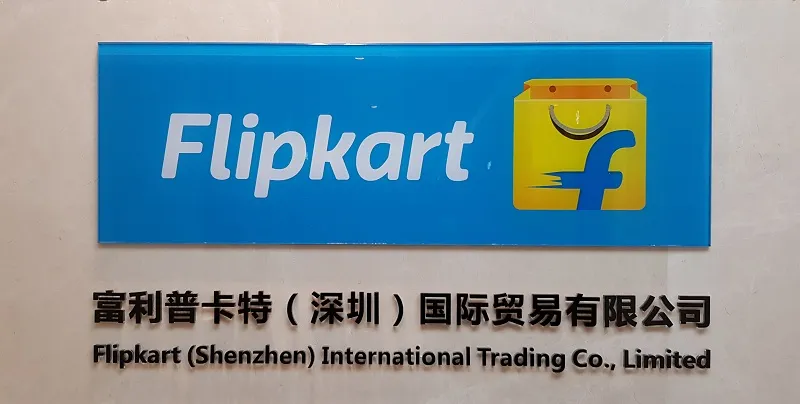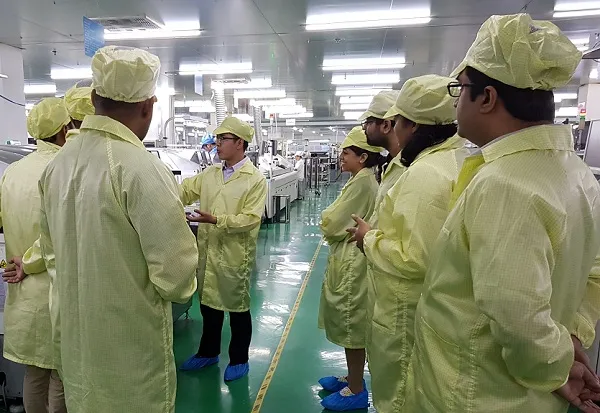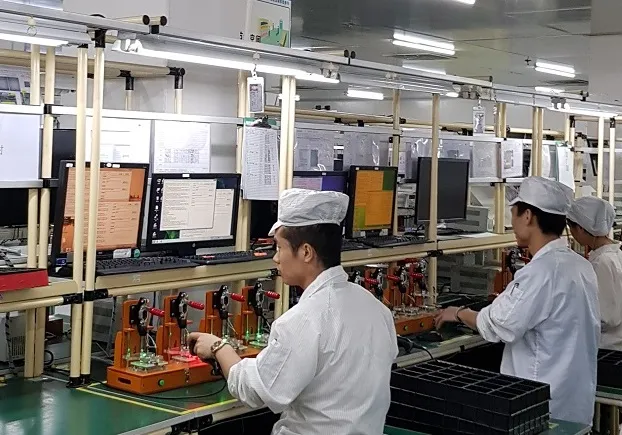Find out how Flipkart ensures quality of its private label products
Storing a gigabyte of data is no pain as USB pen drives are easily available and affordable today. But what goes behind the scenes is a long process of prototyping and multiple testings to ensure the best quality. It is a process that is fascinating to watch.
This reporter was in Delhi and Shenzhen as part of a tour arranged by Flipkart last week. The trip was part of Flipkart’s tenth-anniversary celebrations in which the company has dedicated each month for a specific stakeholder – August is for Flipkart’s partners.
India’s largest e-commerce marketplace Flipkart has thousands of brands on its platform and yet it has chosen to launch private labels to plug gaps that it has identified through data. Under the umbrella brand of Flipkart Smartbuy, it has launched 32 categories in home, electronics, and fashion. Flipkart is set to launch over 10 more categories by the end of the year.

In Delhi, we visited Intertek’s testing lab that specialises in Electrical and Electronics with Flipkart. Intertek is a UK-based product testing and certification company that helps clients identify and mitigate the intrinsic risk in operations, supply chains, and business processes. They are partnering with Flipkart in TV, USB-drives, home appliances and cookware safety, performance and regulatory testing through audits and factory inspections to ensure that intrinsic risks are identified and mitigated at the supplier end.
Four step programme
The quality check process follows this order:
Step 1: Product identification
Step 2: Product qualification with prototype
Step 3: Mass production
Step 4: Post production batch testing – international quality check process with samples
As a horizontal player, Flipkart gets data by category. For whatever consumer needs which are unmet, they create products to solve those needs.
Adarsh Menon, Vice President and Head of Private Labels at Flipkart, explains the process: “We introduce products in small scale, get market feedback – which is quicker online for reaction from the customer (in less than a month) – and then make changes in the next batch. For instance, we had introduced an earphone without a mic at a particular price range. But since customers asked us for the mic as well, it had to be remade from the next batch. Also, the price range of Mixies stays between Rs 1,300 and Rs 1,500; but we give an extra jar due to customer request.”
The checklist for each category is different. But there are certain common criteria too: safety from electric shocks or sharp ends, reliability (functioning well despite repeated usage), functionality (hard core performance), extreme conditions (low voltages for electric items, harsh detergent for bedsheets), and customer usage.
Need of the hour
With growing competition, quality has beaten pricing as the differentiator for the consumer in the purchase of high ticket items and electronics. As a result, demand for Total Quality Assurance (TQA) solutions is increasing. The brands are not satisfied with just the quality and safety of physical components and reliability of their processes.
Intertek claims that its TQA value proposition has a systemic approach to quality and safety. For Flipkart, this means higher quality products and services through independent quality assurance services. This is expected to bring more repeat customers (less returns), and increase customer loyalty.
For Flipkart they provide assurance through audits in factories that manufacture the Smartbuy goods, working with existing test protocols and developing new ones for their electrical and electronic products. These inspections help minimise the risk of defective products by ensuring they meet both customer standards, and industry and government regulations. This serves to protect Flipkart’s business interests, and help ensure manufacturing of quality products.
Flipkart is sourcing hard goods from China and furniture from Malaysia in response to customer demand. Intertek provides ATIC (Assurance, Testing, Inspection, and Certification) services required to maintain the quality, safety and performance of these products.

Finding the right partner
When Flipkart was launching its private label it obviously needed a framework for safeguarding its quality. Adarsh says that since Intertek works with a bunch of brands they had the requisite expertise. Intertek does R&D to bring products to market faster while assuring quality, safety, sustainability, performance, and compliance with regulatory norms. Also, Intertek helps identify the best suppliers for Flipkart in terms of supply, inventory, and processes.
So far, 32 categories have been launched under Flipkart’s private label. Four more will be launched in September (IT accessories like mouse, keyboard, selfie stick), and 10 more before December.
For technical audits, the scope is verification of their current quality management systems and procedures in the production site. They also make recommendations in transit processes to ensure minimal breakage, as well as in workplace material handling and storage.
More brands are coming up in furniture soon from Flipkart in China and Malaysia, and Intertrek will be a part of it then. Flipkart engineers also validate to ensure safety.
Intertek has been investing and growing its operations in India over more than 20 years. They are present across 30 locations in India, with 19 labs. All products are required to be tested for Bureau of Energy Efficiency (BEE) as well as Bureau of Indian Standards (BIS). Intertek India is recognised by BEE to provide testing of refrigerators, room air-conditioners, water heaters, laptops, desktops, LCD TV, and other appliances.
Intertek also serves companies, government and industry associations like BEE (Bureau of Energy Efficiency), EEPC (Engineering Export Promotion Council), QCI (Quality Council of India), Ministry of Power, Ministry of Electronics and Information Technology, MNRE: Ministry of New And Renewable Energy, Ministry of Skill Development And Entrepreneurship (National Skill Development Council), and Ministry of Micro Small and Medium Enterprise (MSME).
Location-agnostic

At a time when ‘Make in India’ is being promoted aggressively, Flipkart has chosen to expand its production outside the country. For their private label, less than 50 percent of production is done in India, and the rest in China and Malaysia.
Adarsh says that it’s not the location they are worried about but the quality of work. They are keen on processes and high on automation. “This results in a lesser cost of manufacturing, as well as in better standards of products and efficiency. We are picky about sellers who procure inventory, assemble, and sell to us,” he adds.
Suppliers’ quality processes and production capabilities, infrastructure, delivery capabilities, market history, and the other partners they work with are all factors which Flipkart counts while selecting each partner. “We need to have a common wavelength in customer obsession and quality,” adds Adarsh.
For instance, Sharetronic Group - which manufactures power banks for Flipkart – also serves top brands including Lenovo, Huawei, and Toshiba. “Our core strength of R&D and state-of-the-art manufacturing is nicely complimented by Flipkart's wide reach, customer focus and leadership in India. We work with several global brands such, and follow the same quality control and turnaround time on Flipkart private label products,” says the company spokesperson.
(As part of the media tour, this reporter had visited the factory at Weiqiang Science and Technology Park, Yinhe Industrial Zone, Dongguan, China.)
History always repeats itself
It is not easy to make a profit in business-to-customer (B2C) e-commerce. No player in India has cracked that code yet. But if commission from sellers on their marketplaces is not making a profit, there is only one way out for e-commerce platforms — private labels.
What is it that the consumer wants that is not met by the current range of merchandise, in terms of price range, aesthetics, look and feel? What are they searching for, and not getting online? Private labels fill the gaps in consumers’ needs.
Flipkart’s arch rival Amazon has been globally successful in its private label efforts – Amazon Basics in fashion, Amazon Happy Belly in food, and Amazon Echo in electronics to name a few. With competition between Amazon and Flipkart increasing every day, Flipkart is hoping that taking a leaf out of Amazon’s book will put them on the right path.
In its race for profitability, Flipkart’s private label can be the game changer, as the brand claims to enjoy great equity – for their quality, price, and service. Adarsh is certain that Smartbuy inherits the same credibility from the mother brand.
Adarsh says, “Profitability is the end output. First, we need to do everything to get there, a prominent one being identifying customer needs.” Private label products now contribute to five percent of total revenue at Flipkart. The company is targeting to bring this to 10 percent by the end of this fiscal.
Flipkart gets 10 percent extra margin on Smartbuy products from the hundreds of sellers with Flipkart Assured badge. RedSeer Consulting estimates that private labels will triple their share in Indian e-commerce this year. But FDI norms restrict marketplaces from production and sales like a retailer. Since FDI regulations do not allow e-commerce marketplaces to sell directly on their platform, Flipkart sells Smartbuy products through licensed sellers.
Flipkart's private label push is a key piece in its strategy to grow profitably. We will keep a close watch on the progress.







